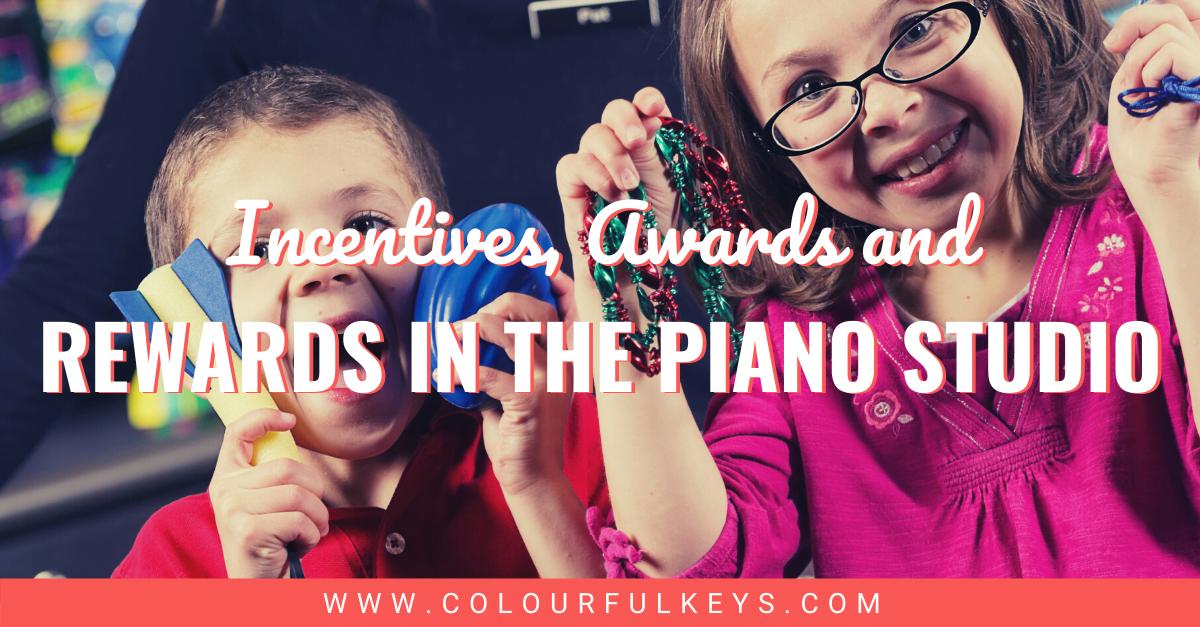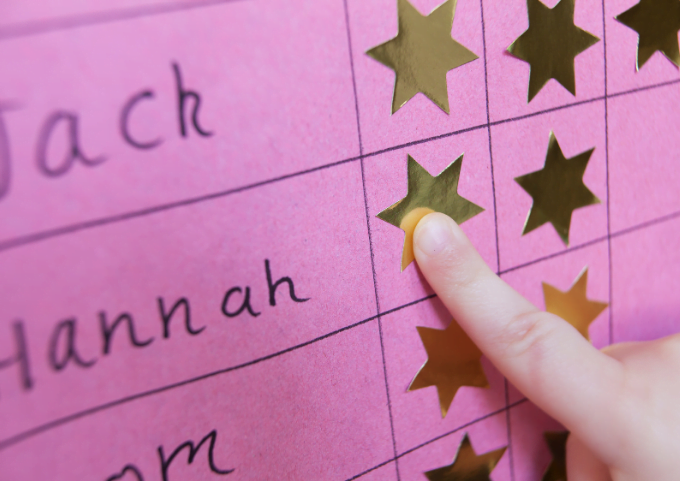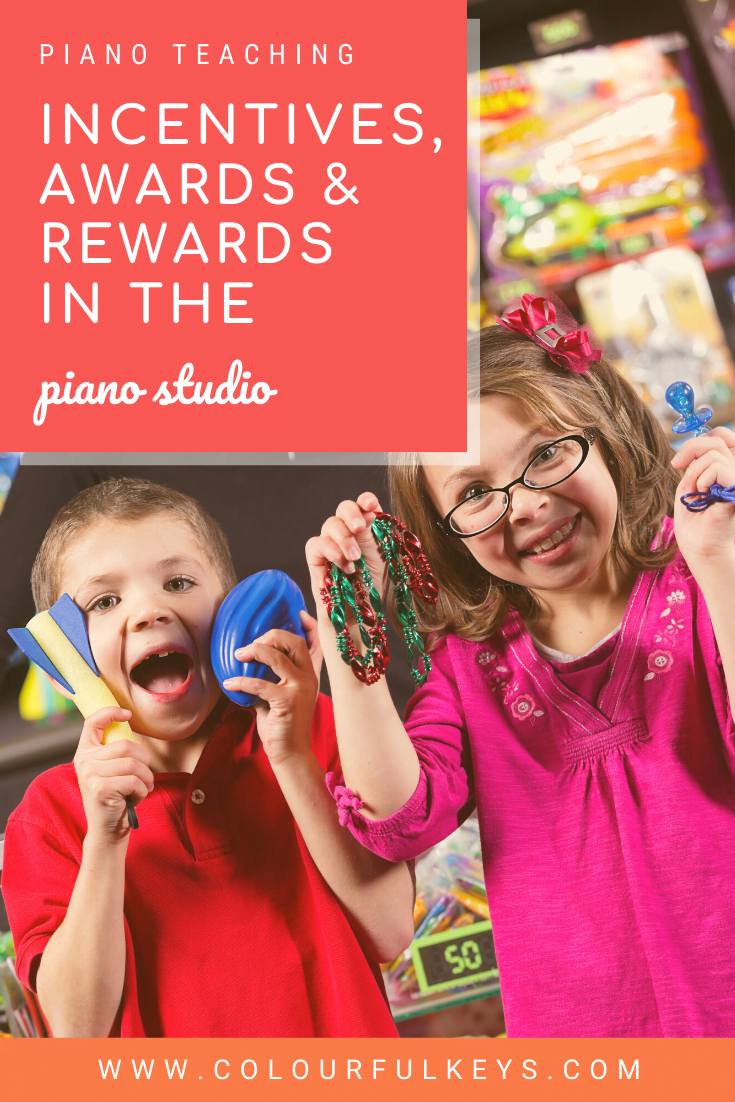Incentives, awards and rewards are common practice in many piano studios. If you use them, you’re a raving fan. If you don’t, you’re staunchly opposed.
Whichever side of this debate you fall on, let’s stop and think about each type of external motivator.

⬆️ Listen to the podcast above or keep on reading, whichever fits your style. ↙️
We all want our students to play music because they love it. But when it comes to rewards, incentives and awards, the consensus is not there.
Some think that adding these types of programs can propel students forward and lead to lifelong musicianship. Others think they’re a distraction and that our focus should be purely on the music.
These three different ways of motivating students might seem interchangeable, but they’re not.
Incentives, awards and rewards can actually behave very differently. So, let’s unpack each one separately.
Need more help with motivation and goals in your music teaching studio? I have an entire section devoted to that on my Piano Practice page. Check it out for the latest and greatest advice, tips, ideas, and freebies.
Piano Studio Incentive Programs
What are piano studio incentive programs?
Piano studio incentives are generally structured programs designed to motivate kids to practice. They include things like practice sticker charts and studio posters where students progress on some kind of path.
Some may also consider my challenge board to be an incentive program, although in reality it’s more like an awards program so more on that in the awards section. 🙂
Are piano studio incentives worth it?
Incentive programs, when done well, can be a fun way to bring together students in your studio. What I don’t love using them for is motivation.

When you rely on an incentive program to motivate your students, you shift the focus away from what they’re practising and the progress they’re making. Instead, they’re focussed on understanding and tracking the chart or poster.
If you are going to do a studio-wide, themed incentive, I suggest you look at it through the lens of community. Talk about how you’re working together to get the pirate to the ship, not about how much the individual student needs to practice to get their pirate to their ship.
Rewards in the Piano Studio
What counts as a reward in the piano studio?
A reward is something you know is coming based on an action you take.
The most common rewards in piano studios are candy, gift cards and small toys or other trinkets.
Well, no, scratch that. The most common reward in the piano studio is praise.
Many students work hard purely to please their teacher. If that is why they are practising, then it is their reward.
Whether you’re handing out lollipops or just “good job!”s you need to think carefully about your use of rewards in the piano studio.
Are rewards effective for piano students?
Many would argue that they’ve seen rewards motivate a student when nothing else would. At first glance, Stephen practising his scales every day for 2 months just for a $5 ice cream gift card seems like a great deal to us. 🍨 🥄
But tread carefully.
We need to pay attention to the long-term consequences of whatever rewards we offer in our studios. What happens to Stephen when he gets his gift card?

Hopefully, he has built a habit of daily scale practice that can continue on. The danger, though, is that Stephen has learnt that he “gets” something when he practises scales.
Why would he do something for free now that he has been paid to do it?
If we want to create lifelong musicians, then rewards are not likely to be the best route.
Awards for Piano Students
What are awards for piano students?
Though they share 4 letters, awards and rewards behave quite differently.
An award is something you receive for an action you take – but it’s something you do not expect to get.
If you work hard, you may have a dream of getting an award which acknowledges your effort. But you do not assume you will. There is no promise or guarantee.
Are awards useful in the piano studio?
The same thing (ice cream, a glitter pen or praise) can behave either as an award or a reward.
The most important thing, in my opinion, is that you know which it is before giving it.
If you decide to tell a student they’ll get a reward for practising their scales, it should be because:
- You don’t think there’s another way to get them to practise scales.
- You believe that if they practise them they will learn to love them and won’t need an external motivator next time.
On the other hand, an award is warranted if you want to show your student how proud you are of their accomplishment. It also, perhaps more importantly, gives them a memento which allows them revisit their own pride in the future.
That’s what the challenge board accomplishes in my studio. It really bundles incentives, awards and rewards for piano students into 1 object. But its most important function is as a reminder of a student’s hard work and how good it felt to work hard towards a goal.
Do you use incentives, awards or rewards in your piano studio?
This can be a hot topic so I’d love to hear your opinion in the comments below. 🙂

In my opinion….you stated this matter all very well. How can one phase out or stop the incentive rewards? Is there are gentle or good way to do it rather than going cold turkey?
I have a daughter in a stringed instrument group for homeschool children where they get lessons, theory class, and the practice (practise )
of playing in a group. The music bucks system seems to work wonderfully in this class setting, where students are motivated not just by the bucks, but by watching classmates succeed in something, say note reading or bringing in a small report on a composer, and they want to be as good as little Billy and achieve like him. In private lessons, this doesn’t exist and the bucks have a different feel. Like paying them…rather in a class setting where children see one another efforts and accomplishments.
I think you’ve made a good point, Jennifer! I use some incentives but I try to tie them to “extra” work instead of just straight practicing. For example, I like for my students to use the VMT scale sync tracks but many of my students don’t so I incentivize that part of scale practice. Or, if their pieces have a backing track, I give “points” for playing along with it. No, those things don’t HAVE to happen during practice, but it sure is nice when they do:)